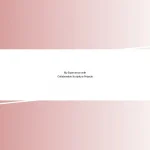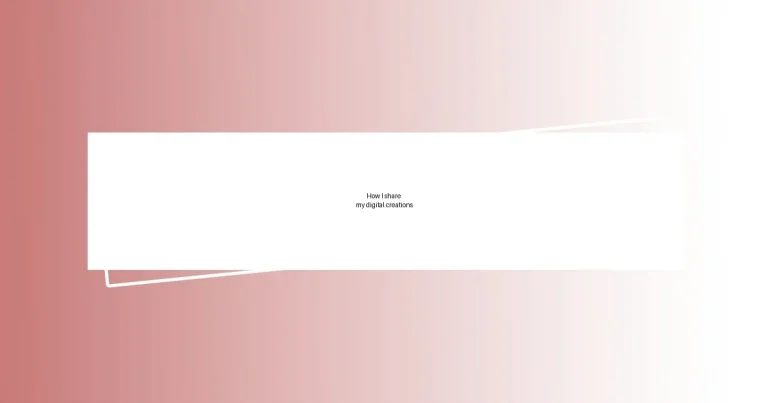Key takeaways:
- Experimentation with different platforms is crucial for finding the right fit for your creative style.
- Engaging content thrives on authenticity, personal stories, and understanding your audience’s interests.
- Consistency in posting and leveraging social media features enhances visibility and strengthens community connections.
- Listening to audience feedback and adjusting content accordingly can greatly improve engagement and creative satisfaction.
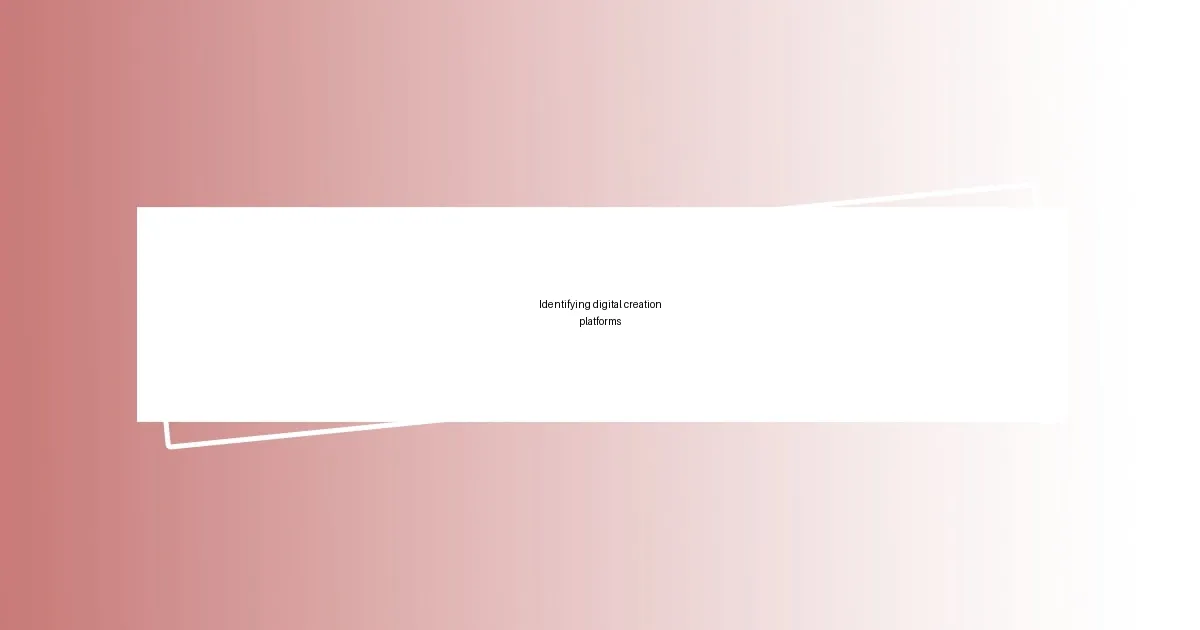
Identifying digital creation platforms
When I first started exploring digital creation platforms, I felt overwhelmed by the sheer number available. Each platform offers unique features tailored for different types of creators, from graphic designers to writers. For instance, did you know that Canva’s intuitive interface pulled me right in when I was just dabbling in design? It made creating visually striking graphics a breeze!
As I delved deeper, I found that platforms like Adobe Creative Cloud cater more to those seeking professional-grade tools—albeit with a steeper learning curve. It got me thinking: how do you know what fits your style? For me, experimentation was key. I remember feeling a rush of accomplishment the first time I edited a video with DaVinci Resolve. It was intimidating at first, but I discovered the joy of creation is often in the challenge.
I also learned that community matters. Platforms like Behance not only showcase your work but also connect you with other creators. The shared inspiration and feedback can ignite creativity, making the process not just about sharing artwork but forming relationships. Honestly, have you ever felt that spark when connecting with like-minded individuals? It’s exhilarating and can elevate your creations to new heights!
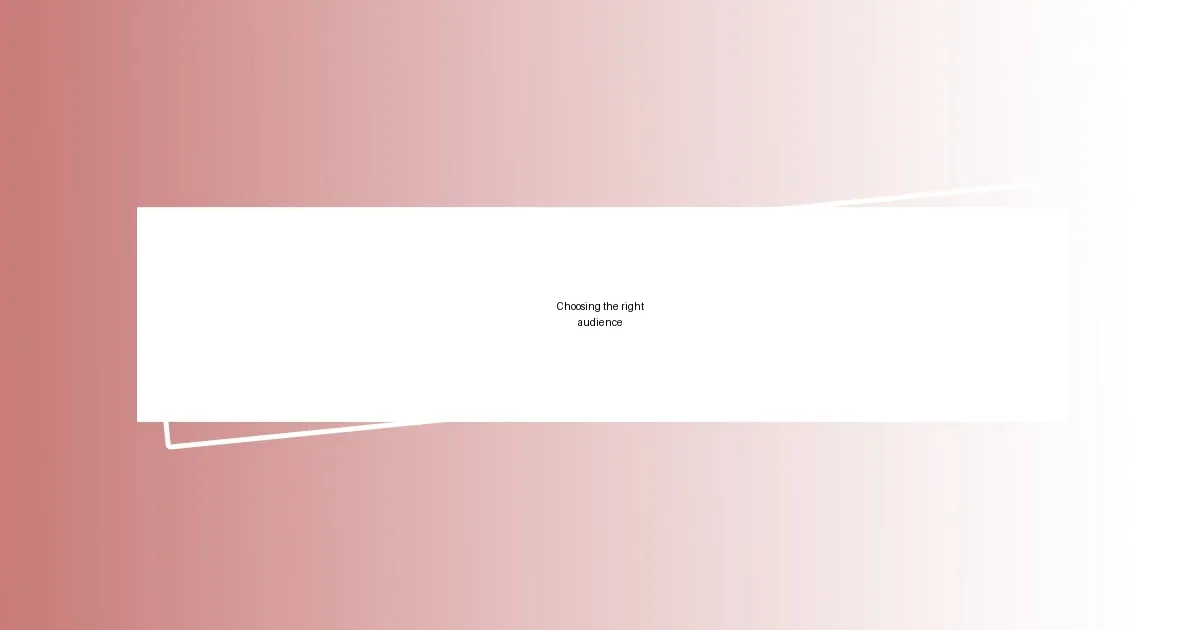
Choosing the right audience
Choosing the right audience is crucial when sharing your digital creations. I remember my early days when I posted my artwork on various platforms without considering who would be viewing it. It wasn’t until I found my niche audience—people who genuinely appreciated my style—that I started receiving meaningful feedback and encouragement. It’s like performing a song for an audience that resonates with the lyrics; everything feels more alive, doesn’t it?
In my experience, targeting the right audience means aligning your content with the interests of those you hope to reach. For example, when I began focusing on eco-friendly themes in my illustrations, I connected with a community that shares my passion for sustainability. The level of engagement skyrocketed! Have you ever changed your approach based on who your audience is? It’s fascinating to see how tailoring your work to a specific group can enhance both your reach and personal satisfaction.
To truly connect, one must also consider the platforms where this audience spends time. After experimenting with different social media channels, I realized Instagram and Pinterest are fantastic for visual creations while forums like Reddit cater to niche interests. By directing my efforts toward the right spaces, I maximized my impact and found joy in the connections I made along the way.
| Audience Type | Platform |
|---|---|
| Creative Professionals | Behance, Dribbble |
| General Public | Instagram, Facebook |
| Niche Enthusiasts | Reddit, Specialized Forums |
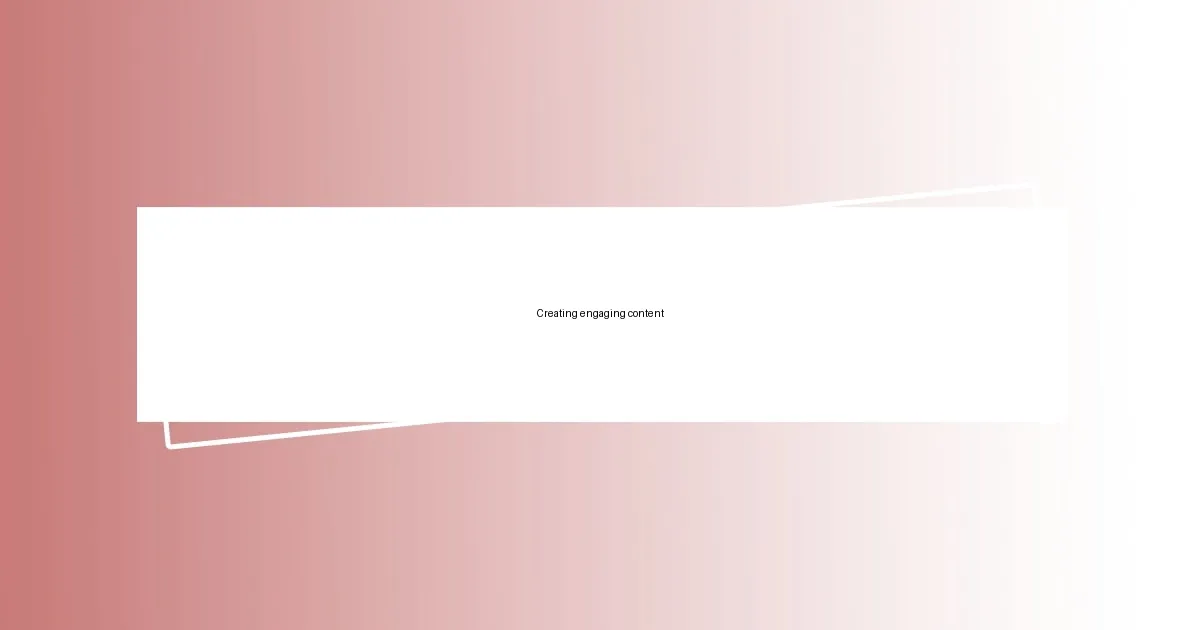
Creating engaging content
Creating engaging content requires not just creativity but also a genuine connection with your audience. I’ve found that infusing personal stories into my work engages viewers on a deeper level. For instance, when I shared a design inspired by a meaningful childhood memory, I noticed an influx of comments from others sharing similar experiences. It’s fascinating how vulnerability can spark a dialogue and foster a sense of community.
Here are some practical tips for crafting engaging content:
- Be Authentic: Share your personal journey and insights. Authenticity resonates with people.
- Use Visuals: Eye-catching images or videos can elevate your content instantly.
- Ask Questions: Encourage interaction by posing questions. It invites dialogue and keeps the conversation going.
- Tell Stories: Relate experiences that connect to your content. Stories draw people in.
- Explore Trends: Stay updated with trends in your niche; it can guide you in creating timely and relevant content.
Engagement is not just about what you produce, but how you relate it to your audience’s lives. In the end, I believe that creating content they can connect with—whether through shared experiences, nostalgia, or common passions—makes all the difference.
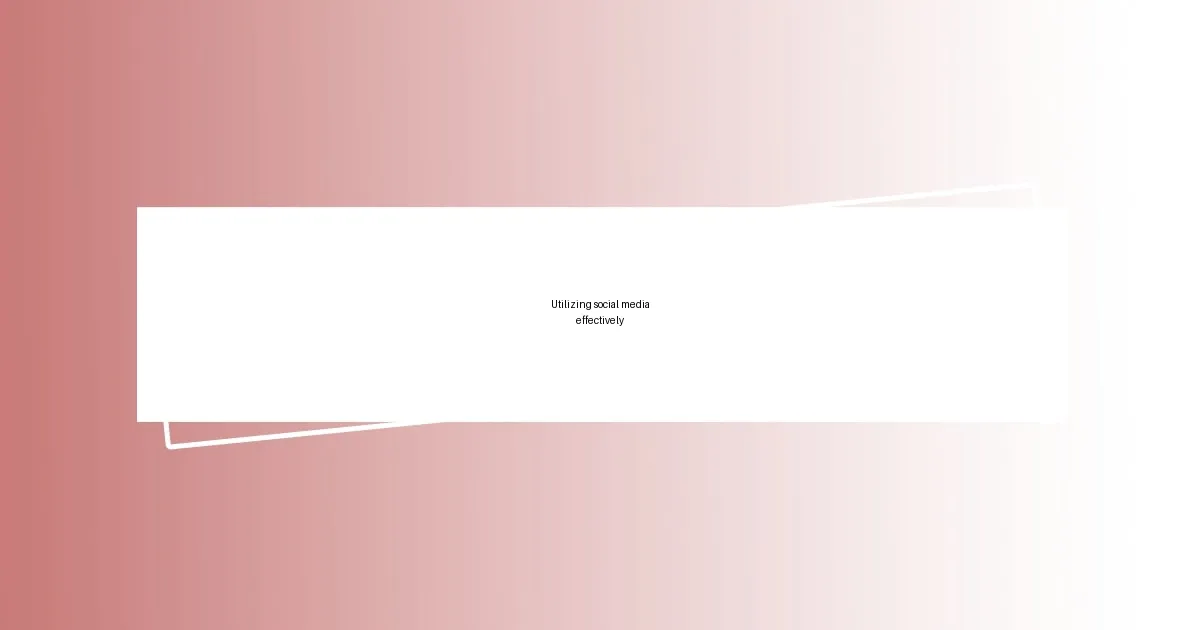
Utilizing social media effectively
Leveraging social media effectively means understanding how to use its features to your advantage. I remember feeling overwhelmed by all the options available—stories, posts, reels, and lives. But once I started experimenting, I discovered that sharing behind-the-scenes moments of my creative process resonated with my audience on a whole new level. Have you ever shared a work-in-progress? It’s a beautiful way to invite people into your creative journey and highlight the effort behind the final piece.
Consistency is vital in building a social media presence, as I’ve learned through trial and error. Initially, I would post sparingly and then drop off for weeks, wondering why my engagement rates were low. It wasn’t until I committed to a regular posting schedule—whether that was weekly updates or daily insights—that I saw a steady growth in my following. I realized that viewers crave routine and familiarity. How often do you interact with creators whose work you love, just because they show up regularly? This consistent presence can make all the difference.
Hashtags, too, play a significant role in enhancing visibility and connecting with new audiences. I’ve found that researching trending hashtags related to my content can expose my posts to a much broader audience. One time, I used a popular but relevant hashtag for an art piece, and it led to a feature in a community spotlight. It felt incredible to see my work appreciated by people I’d never reached before. Isn’t it exciting when simple strategies yield such impactful results? Social media is not just a platform but a bridge to a larger community, and using it wisely can amplify your creative voice.
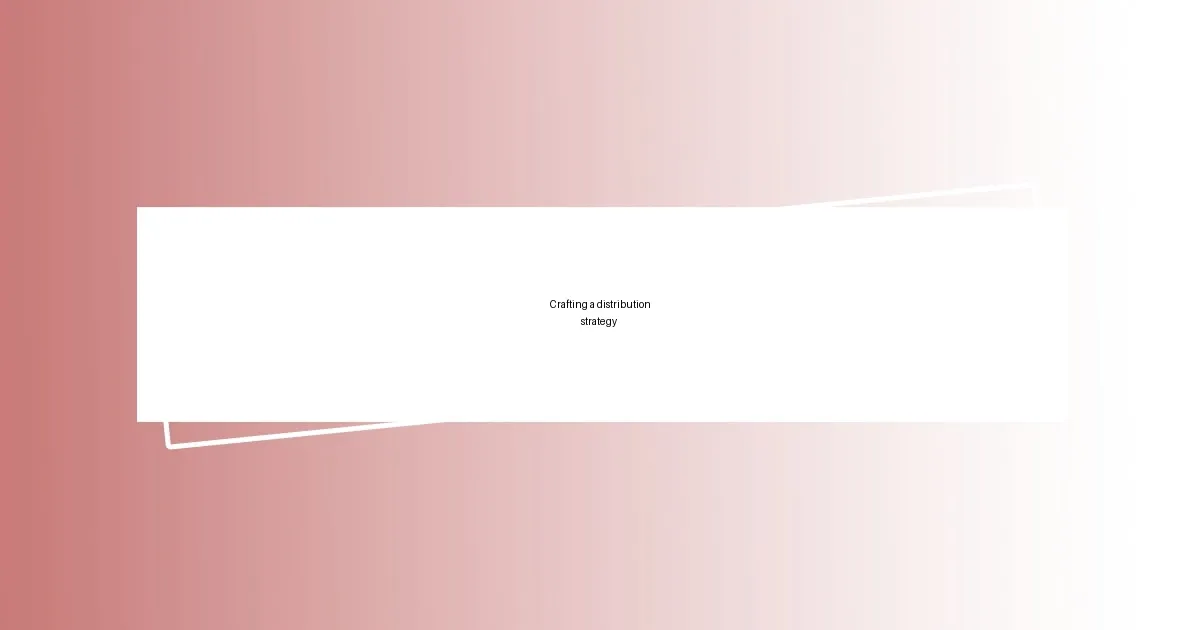
Crafting a distribution strategy
Crafting a distribution strategy involves more than just sharing your work; it’s about determining where and how to showcase it for maximum impact. I’ve learned that identifying the right platforms for my creations is crucial. For instance, I once dedicated time to tailor my illustration posts for both Instagram and Pinterest, and I quickly noticed how each platform evoked different audience engagement. Has your experience shown you that not every platform enhances your work in the same way?
To truly resonate with audiences, scheduling is key. I remember launching a new project and spreading my promotional posts over several weeks instead of all at once. This approach not only built anticipation but also encouraged conversation as I shared updates. Have you ever noticed how suspense can elevate interest in a project? It’s a delicate balance of visibility and freshness that keeps your audience invested.
Finally, don’t underestimate the power of collaboration. Partnering with others can enhance your reach exponentially. For example, I teamed up with a fellow artist for a joint online event—not only did we share our audiences, but we also exchanged valuable insights on our creative processes. It created a buzz that neither of us could have achieved alone. How could collaborating with others amplify your voice? Exploring distribution strategies has shown me that sharing is a multifaceted journey, and the right approach can open up a world of possibilities.
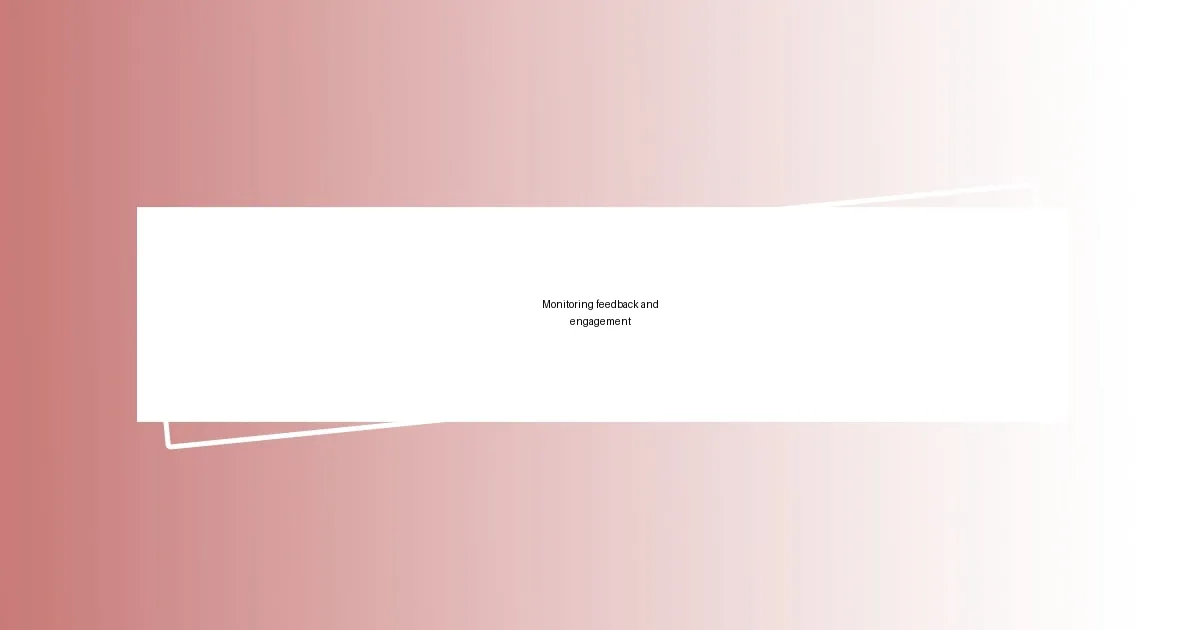
Monitoring feedback and engagement
Monitoring feedback and engagement is essential for refining my creative process. I remember the first time I received a heartfelt comment from a follower about a piece I labored over. That simple, positive feedback fueled my motivation and made me realize how powerful my work could be for others. Tracking comments, likes, and shares helps me understand what resonates, allowing me to create content that genuinely connects.
Engaging with my audience also involves actively seeking out constructive criticism. I often share my work in progress and invite my followers to share their thoughts. Once, a viewer pointed out an aspect of my design that I hadn’t considered, opening my eyes to a new perspective. Have you ever found that a fresh pair of eyes can reveal something previously unseen? I’ve learned that such interactions not only improve my art but also strengthen my bonds with my audience.
Moreover, analyzing engagement metrics has become part of my routine. I find it fascinating to look at the data and see which pieces garner the most attention. Recently, I discovered that my more personal stories attracted far more engagement than my polished finished pieces. This revelation encourages me to continue blending vulnerability with creativity. How often do you reflect on what your audience truly values? I’ve realized that understanding engagement isn’t just about numbers; it’s about nurturing relationships and fostering a community around my work.
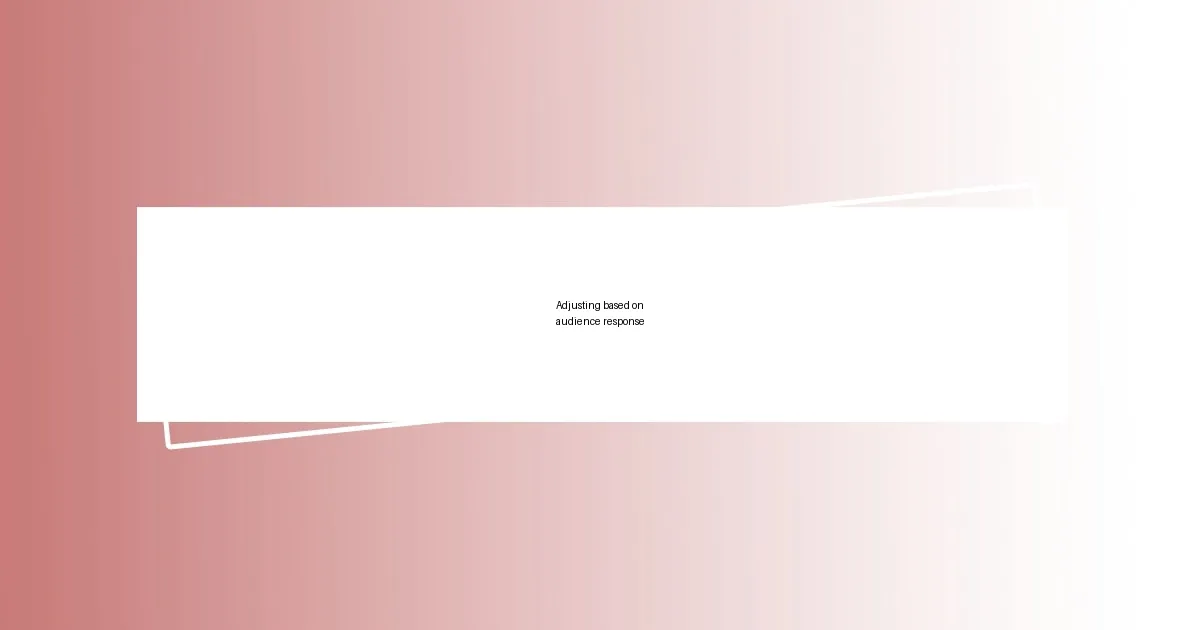
Adjusting based on audience response
Adjusting based on audience response has been a game-changer for me. After posting a new video tutorial, I was surprised to see the comments filled with requests for specific topics. It made me reflect: why not let my audience guide my content? Embracing their suggestions not only fosters a sense of community but also ensures that I create what they truly want to see.
I’ve also experimented with different styles and formats based on feedback. When I shared a minimalistic art piece, the response was lukewarm. However, after I combined that style with vibrant colors, the enthusiasm was palpable. This experience taught me how to read the room, so to speak—sometimes, a little tweak can unlock a world of connection. Have you ever surprised yourself by how quickly your audience shifted their interest?
Listening to my audience has helped me refine my creative voice. Early on, I used to post impulsively, only to receive mixed reactions. Now, I take a moment to look at past interactions, carefully considering what resonates. It’s like having a conversation; when I show I’m paying attention, my audience feels valued. How do you incorporate feedback into your creative journey? I’ve found that this responsive approach not only enhances my work but also deepens my connection with those who appreciate it.








